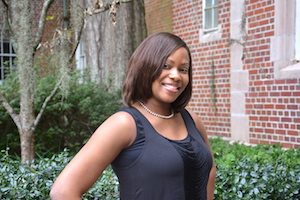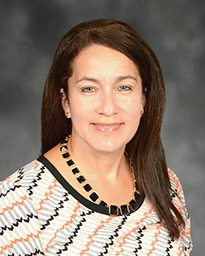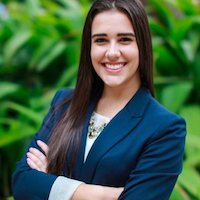Doctor of Philosophy in Education

– Natalie King
Could you tell us more about your background in science before pursuing a career in science education?
My undergraduate degree was a Bachelor of Science in Applied Physiology & Kinesiology with a specialization in Exercise Physiology. I enjoyed learning science and was on the pre-med track. After graduation, I wanted to teach high school science for a few years before applying to medical school. While teaching, I realized that I had the content-knowledge, and wanted to learn effective pedagogical practices to ensure that I met the needs of all learners in my classroom. This inspired me to do a masters program in Special Education. Nearing the end of the masters program, I added an extra course – Inquiry-Based Science course taught by Dr. Rose Pringle. This course was so effective in transforming my approach to teaching science that I decided to begin a PhD Program in science education instead of applying to medical school.
Did you have prior experiences with science education?
My prior experiences in science education began with teaching high school biology and chemistry for three years followed by developing a summer program focused on Science, Technology, Engineering, and Math (STEM). I infused my passion for science and medicine by teaching an Introduction to Health Professions course at the Health Care Summer Institute (HCSI) at UF College of Medicine. I developed the curriculum and designed the syllabus for the course and instructed high school students from North Central Florida for four weeks each summer for the past seven years. I have also served as an instructor for College For Kids at Santa Fe College where I taught 3 courses focused on anatomy and preparing adolescents to think about college and careers, and designed an introductory chemistry and biology course for elementary and middle school students.
You had a lot of program options, why did you choose to pursue a Doctorate in Science Education? Did your career goals have anything to do with your decision?
Initially, my career goal was to go to medical school with hopes of reducing health disparities by providing low-income families with access to high-quality treatment and also focus on preventative medicine. My career goal was to open community-based clinics and lead medical mission programs to other countries. Pursuing a doctorate degree in Science Education has allowed me to continue fostering my passion for science, while providing programs for underrepresented students to receive high-quality STEM experiences. I am also preparing pre-service and in-service teachers to implement inquiry-based science for all learners, and am directly impacting the science experiences of children of color (particularly those from low-income households).
What kind of research did you decide to pursue for your thesis? How did this relate to your experience as a science teacher?
My research agenda (and dissertation work) addresses one of the most critical issues in science education which is improving the science learning experiences for children of color. Specifically, I investigate how the informal learning environment can provide diverse students with access to authentic and meaningful science learning and exposure to STEM careers. In 2012, I established a summer program that targets underrepresented minorities in STEM, particularly in underserved areas, with goals of improving their interests, identity, and engagement in STEM education. My research agenda and community efforts seek to equip children of color to position themselves as STEM learners and develop a greater appreciation for the importance of the STEM disciplines in their individual lives as citizens. I continue to develop my research agenda around the goals of the program. To date, I have shared my research findings at international, national, and state conferences and submitted manuscripts to related journals. My efforts have resulted in a number of manuscripts at various stages of development..
I heard that you assist Rose Pringle with the U-FUTuRES 2.0 certificate program. Could you tell us more about that experience and about the program?
My experience as the science education project associate for the NSF Math Science Partnership project U-FUTuRES (University of Florida Unites Teachers to Reform Education in Science) has been rewarding. This comprehensive professional development project seeks to transform science teaching and learning in middle schools by preparing Science Teacher Leaders (STLs). My role includes facilitating workshops, conducting classroom observations, and assisting the STLs in implementing transformative practices and in developing Professional Learning Communities (PLCs) within their schools and districts. Participation in this project led to the award of the NSF I-Corps for Learning grant where, as the Co-PI, I served as the entrepreneurial lead. This venture has resulted in the scaling and sustaining of U-FUTuRES as an accelerated STEM Certificate Program serving 4th – 8th grade teachers – U-FUTuRES 2.0. I continue to direct activities related to science education including maintaining the collaboration among science educators, scientists, school administrators, teachers, scientists and graduate students from the college of education and natural sciences. I also speak with district personnel to understand their science education needs and see how U-FUTuRES 2.0 can prepare teachers in their districts to lead professional development with their colleagues and increase student science achievement.
What has it been like teaching other science teachers? What do you think the participants have gained from these experiences?
I have worked with science teachers across the state and have learned with and from them about the current landscape of science education in K-12 classrooms. My ability to train and prepare pre-service and in-service teachers with the tools, resources, and understanding to effectively implement inquiry-based science in their classrooms has allowed them to create a learning environment that is conducive to the learning needs of all students.
How has the faculty in the program contributed to your experience with the Science Education program?
The faculty in the School of Teaching and Learning in general, and in Science Education specifically, are extremely supportive. They challenge graduate students to understand their passion and provide experiences to develop the necessary skills to achieve their career goals. The faculty understand the current reform efforts in science education and engage in cutting-edge research in the field. In addition, they encourage opportunities to present at research conferences and meet other scholars in the field. Furthermore, the faculty mentor you on how to effectively prepare pre-service teachers to teach science, and be receptive to the needs of in-service teachers.
Why did you choose University of Florida’s doctoral program over similar programs?
What advice would you give to others who might be considering the doctoral program in science education at UF?
My doctoral program in science education at UF changed my entire career trajectory. The teaching, research, and service experiences that I garnered as a graduate student equipped me with the necessary knowledge, tools, and resources to be highly competitive in the job market. As I am transition from a graduate student into a tenure track assistant professor position, my goal is to position myself to make a greater impact on the areas of research in science education as it relates to social justice and equity for underrepresented populations in STEM. My advice for individuals who are considering the doctoral program in science education at UF is to come with an open mind, position yourself as a learner, and embrace the breadth of experiences that you will gain. The opportunities to be successful are endless, and the time you invest in the PhD program will pay off, if you just trust the process. Know that you are in great hands because the faculty are supportive and experts in the field.
Masters of Arts

– Mayra Cordero
I hear the Science Education M.A.E is designed for individuals interested in gaining expertise in general science education and strengthening their background in sciences. Could you tell me more about your background in science before starting the program?
I have a bachelor’s degree in Chemistry and a Ph.D. in Pharmacology.
How did your background and experiences as a science teacher influence your decision to pursue a M.A.E in Science Education?
Even though I have a strong foundation in science, at the beginning of my teaching career I quickly realized that I did not have the knowledge to teach at the middle school level. I found myself following a textbook driven curriculum with both a high school reading and content level. These experiences influenced my decision to pursue a graduate degree in Education in order to gain knowledge in the best teaching and learning practices to reach my students.
I heard that you assist Rose Pringle with the U-FUTuRES 2.0 certificate program. Could you tell us more about that experience and about the program?
This program is designed to allow teachers around the state of Florida to develop a better understanding of the current reform in science education, to enact the principles of inquiry-based science in their current curricula and to strengthen their science content background.This opportunity has allowed me to learn about the experiences of a diverse group of science teachers (from 3rd grade to 9th grade) as they implement inquiry-based science features into their lessons. This experience has also helped me better understand the learning progressions from elementary to high school. I was also able to become more familiar with the differences of teaching science in elementary school as well as high school. This experience will support the summer work I plan on conducting in collaboration with the elementary teachers at my school. I was also able to learn from the participants as they shared strategies that I can incorporate into my lessons.
What has it been like teaching other science teachers? What do you think the participants have gained from these experiences?
This experience has also enlightened my practices about how to provide specific feedback not only to teachers but also to students in order to deepen their knowledge and become reflective participants of a collaborative group. I have also learned about the challenges teachers face at various grade levels.
The first course was designed to be completed in 8 weeks. In this short period of time the teachers were placed in a new learning environment sharing their learning in an online forum discussion as well as creating videos their learning. Despite this new learning environment, they were all determined to modify their teaching practices to give their students a better chance at learning science in ways that are meaningful, working like scientists do in real life, asking questions, analyzing data, making sense of the data collected and not merely memorizing a gamut of facts.
How has the faculty in the program contributed to your experience with the Science Education program?
The faculty is extremely supportive and understanding of the multiple roles we play in addition to the coursework. The faculty designed the courses to position myself as a reflective teacher constantly searching for innovative ways to improve my practices through collaboration with other teachers as well as professors. They have invited me to collaborate and present at regional, national and international conferences as well as collaborating in the submission of manuscripts to recognized journals in the education field. The faculty has been available at all times to support me without hesitation. I feel I am considered as another colleague of the faculty.
Why did you choose University of Florida’s M.A.E. program over similar programs?
The University of Florida’s M.A.E. provides a strong foundation on the current reform for science education, inquiry-based teaching practices.
In addition, the University of Florida offers a wide array of opportunities to connect the knowledge gained in a M.A.E to the science content. It is the perfect environment to establish multiple connections with scientists and many other programs and departments, like the Institute of Food and Agricultural Sciences (IFAS), the Center for Precollegiate Education and Training (CPET) and the Museum of Natural History among others.
What advice would you give to others who might be considering the doctoral program in science education at UF?
Pursuing a doctorate degree in education will allow participants to develop meaningful and original research in a specific area of science education. Doctoral candidates will work in collaboration with a supportive and nationally-recognized faculty at the College of Education as well as distinguished scientists and experienced teachers in the area. In addition, the doctoral program in science education will provide candidates with opportunities to become a part of nationally funded projects at the forefront of the current reforms in science education, such as, technology integration and inquiry-based science teaching.
UF-Teach Undergraduate Minor

– Kristen Quintana
I heard this is your last semester before you graduate with your undergraduate degree, congrats! What did you major in?
Biology (CLAS)
What made you decide to pursue a career in teaching?
My whole life I have been so shy. Dance recitals and class presentations were my biggest enemy growing up, but in the classroom everything is different. I am naturally the type of person that loves to learn, but I also love to share my knowledge with others. I also really enjoy watching others grow and reach their potential and being there along the way. Teaching combines the learner and developer in me and just fills me with joy.
It was not until my final semester in UFTeach that I really became committed to pursuing a career in teaching. My internship through Apprentice Teaching exposed me to what it truly means to be a teacher. The good, and the bad. In my placement, I was exposed to two totally different worlds. On the one hand, there were students experiencing the same reality that was my own growing up, extremely successful and supported by the education system. On the other hand, I saw a group of strong but broken students that seemed forgotten and could not find the tools they needed. They had given up because they had accepted the mindset the community was teaching them. But I could teach them different. And I did.
I realized that as teachers, we have the power to make education fun and exciting for any student. We can show them that they can break out of any situation using the power of knowledge. We have the opportunity not only to give them content knowledge, but also to develop their character skills so that they can be successful in any situation, in or out of the classroom walls. Being a teacher is more than multiple periods of the same lesson; it is modeling a mindset of success and leadership so that your students aspire to be successful leaders and once I figured that out, I knew a career in teaching was my only option.
How has UFTeach Minor prepared you for your future career?
UFTeach has helped me develop a love and appreciation for teaching. I never knew how much time and hard work went into teaching, but after 3 field placements and an internship I feel like I have a good idea of what my first year of teaching is going to look like. I know I will struggle, and I know it will probably be the most difficult year of my life, but I am confident that I have most of the tools I will need.
This program prepares you for the classroom in so many different ways. In each class you take on a little more responsibility because you learn something new to incorporate into your teaching. You can take that practice from theory to reality by incorporating it into a lesson for your field placement. Having the ability to try so many different things allows you to really find what works for you.
Throughout the program you develop a sense of confidence based on your experiences. The faculty supports you, your mentors support you, and your peers support you. There is so much collaboration and intent in this program that you never go without feedback. There is always someone watching and trying to help you improve.
How has the faculty here contributed to your experience with the Science Education program?
The faculty in the UFTeach program is truly what makes it so great. I have known the master teachers for all four of my years at UF and they are like family to me now. I have always felt encouraged and supported by the faculty and have turned to them in times of need knowing they would do everything they could to help me.
Because the program is so quaint you are able to develop lasting relationships with the professors in the program. Even after the semester is over, the professors still remember you and show interest in your pursuit of education. They genuinely care and you know that you’re not just a number.





